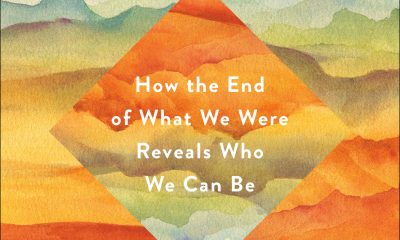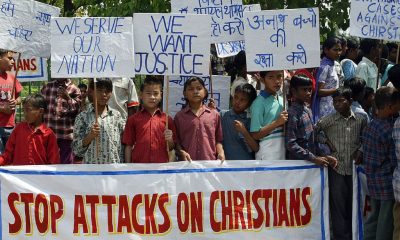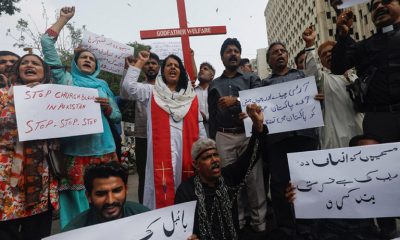world news
Signs in the Heavens: Blood Red Skies in China and ‘Super Flower Blood Moon’ in US
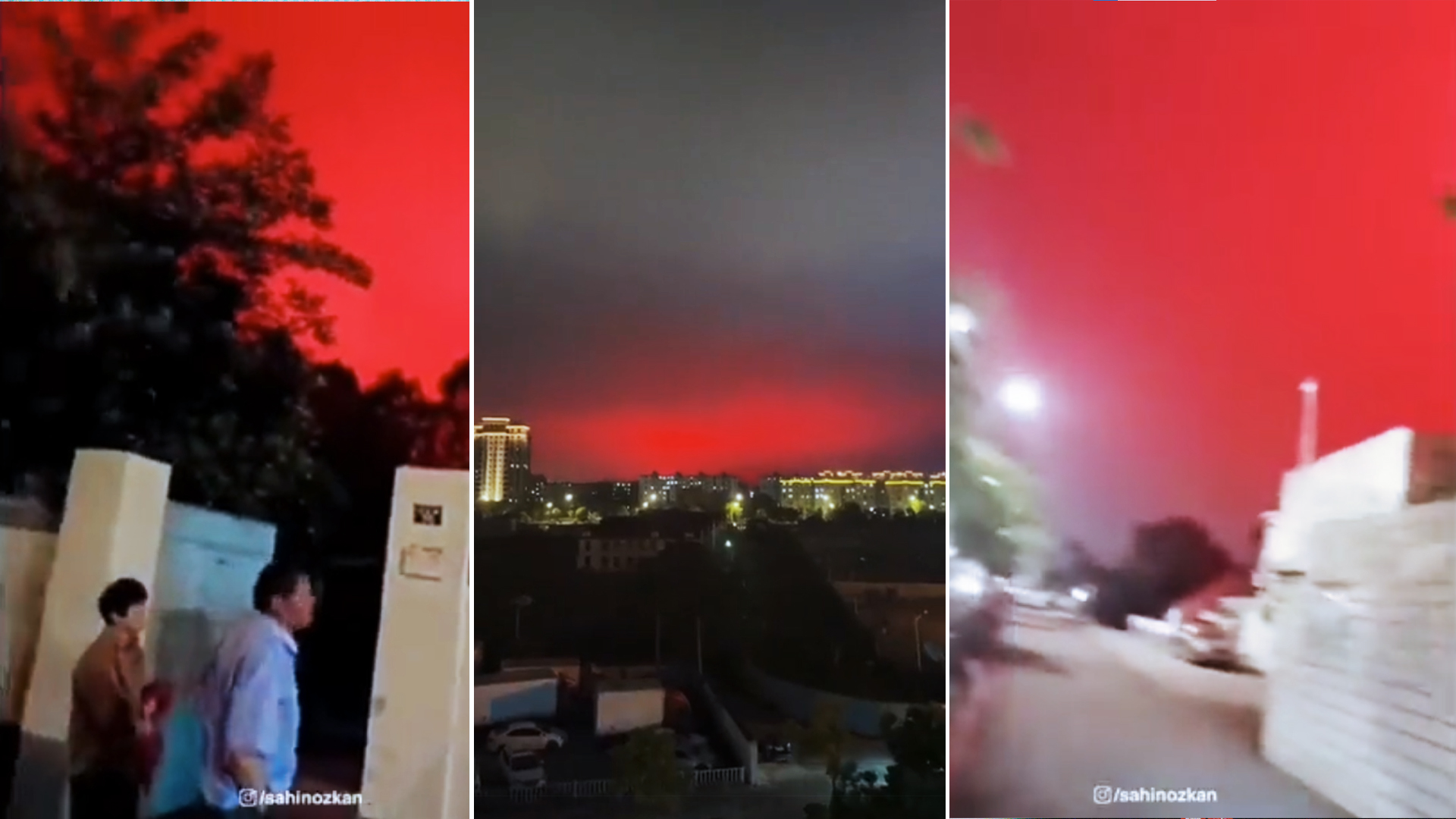
Unique weather conditions in China’s port city of Zhoushan caused the sky to turn blood-red earlier this week, and left many of the city’s residents wondering if the end of the world had come.
A sense of panic could be heard in the voices of some of the residents as they recorded the eerie phenomenon which was seen under thick layers of fog, according to The Daily Mail.
Others thought the red sky was an evil omen for China.
The crimson sky quickly became one of the trending topics on Chinese social media as videos of the event garnered tens of millions of views.
Some users on Douyin, China’s version of TikTok, called the red sky a bad omen over China’s handling of the COVID-19 pandemic, The Mail reported. COVID has recently resurged in the neighboring city of Shanghai where new extreme lockdowns were implemented.
One user said it means: “Accidents will happen.” With another adding. “I started to stock up on supplies.”
Chinese local media later said the blood-red sky was caused by refraction of the lights from fishing boats.
“When weather conditions are good, more water in the atmosphere forms aerosols which refract and scatter the light of fishing boats and create the red sky seen by the public,” said the staff of the Zhoushan Meteorological Bureau, according to the Global Times.
Other users suggested the rare occurrence could have been caused by particulate matter still in the atmosphere from the Tonga Volcanic Eruption in January. NASA has found that the Tonga eruption effects even reached space.
Another video shared by a user who was farther away from the port shows the entire sky over the city was not red, but only the part that was beneath the fog layer.
Historians have found 300-year-old documents from China, Korea and Japan that contain eyewitness accounts of a similar event. According to the accounts, in September of 1770, the skies over the region glowed red and the event continued for more than a week.
Researchers studying the event told Live Science in 2017 that they theorized the red skies were caused by a giant geomagnetic storm that rivaled the most powerful one on record, the so-called Carrington Event of 1859.
The article explained such magnetic storms happen with solar eruptions hit the Earth’s magnetosphere, the shell of electrically charged particles trapped by Earth’s magnetic field. The researchers speculated that if a Carrington-level solar storm would hit Earth today, the resulting hit to power grids around the world would be devastating, leaving most people without electricity.
In Israel, commentators who heard about the latest blood-red skies in China brought up a familiar Biblical reference. During historic events like this, Bible scholars often point to the book of Joel in the Old Testament where a verse describes “blood and fire and pillars of smoke” in the skies.
Joel 3:3-4 reads, “Before the great and terrible day of Hashem comes,* I will set portents in the sky and on earth: Blood and fire and pillars of smoke; The sun shall turn into darkness And the moon into blood.”
‘Blood Moon’ to Be Seen This Weekend across the US
Meanwhile, in the United States, amateur astronomers and other skywatchers will witness the first lunar eclipse of 2022 early Monday morning or late Sunday evening depending on your time zone.
According to NASA, the full moon will appear red in both North and South America and Europe and Africa as part of a total lunar eclipse on May 15-16. A lunar eclipse is caused by the moon going through Earth’s shadow in space.
It will begin approximately at 9:32 PM Eastern time on May 15. The greatest part of the eclipse will be seen around 12:12 AM Eastern. The totality of this eclipse will last 1 hour and 24 minutes.
Some are calling this event a “super flower blood moon.” NASA explains when the Moon moves completely into the umbra—the part of the eclipse known as totality, the Moon turns reddish-orange. This change in the Moon’s color is due to Earth’s atmosphere. The red color comes from some of the sunlight passing through Earth’s atmosphere where it gets bent and colors like blue or green are filtered out, leaving behind longer wavelengths like the color red.
We see this same effect in sunrises and sunsets with the reddish-orange color.
Biblical Implications of Blood Moons
As CBN News has reported in recent years, even though there are scientific explanations for these types of Blood Moons, many Christians also see prophetic implications behind them. That’s because they’re directly mentioned in Scripture.
A Blood Moon is foretold by the Bible in the book of Joel 2:31 which states: “The sun shall be turned into darkness, and the moon into blood, before the great and terrible day of the Lord come.”
Also in Acts 2:20, “The sun shall be turned into darkness, and the moon into blood, before the great and notable day of the Lord come.”
And, in the book of Revelation 6:12, a blood moon also is prophesied: “And I beheld when he had opened the sixth seal, and, lo, there was a great earthquake; and the sun became black as sackcloth of hair, and the moon became as blood.”
All of the Scriptures refer to the moon turning blood red as a heavenly sign the End Times is fast approaching.
Numerous “Blood Moon” events have occurred throughout history since those passages were written, but Jesus told His followers that we should observe the signs of the times, including signs in the heavens. And some preachers claim the large number of Blood Moon eclipses in recent years are just one of many signs that the end of the world is drawing closer and could happen in the near future.
Students of Biblical prophecy point to other historic events like the restoration of the modern state of Israel in 1948, the return of millions of Jews to the Holy Land, and potential precursors to the Biblical mark of the beast as further signs of the End Times.
http://theendtimeradio.com
world news
പാക്ക് ക്രൈസ്തവര് നേരിടുന്നത് കടുത്ത പീഡനം; സംരക്ഷണം ഉറപ്പാക്കാന് ഭരണകൂടം തയാറാകണമെന്ന് സന്നദ്ധ സംഘടന
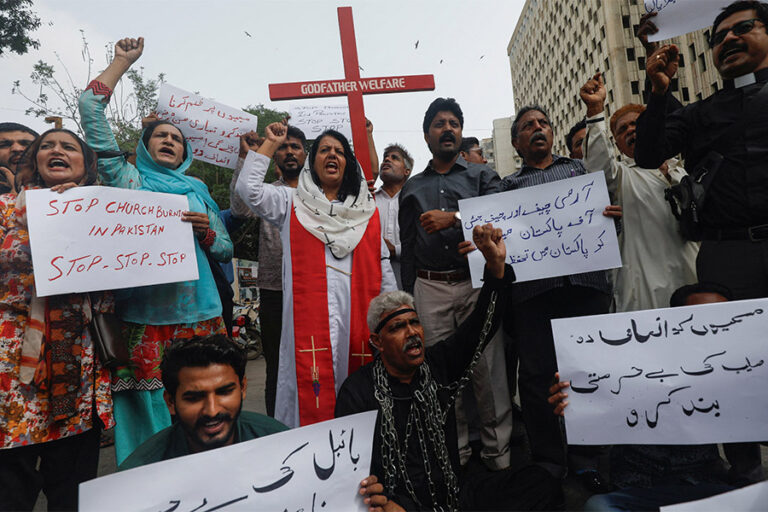
ലാഹോർ: പാക്കിസ്ഥാനിലെ ക്രൈസ്തവരുടെ സംരക്ഷണം ഉറപ്പാക്കാൻ ഫെഡറൽ, പ്രവിശ്യാ സർക്കാരുകള് തയാറാകണമെന്ന് സന്നദ്ധ സംഘടനയായ ഡിഗ്നിറ്റി ഫസ്റ്റ്. കഴിഞ്ഞ ഓഗസ്റ്റിൽ പഞ്ചാബിലെ ജരൻവാലയിൽ ക്രിസ്ത്യൻ സമൂഹത്തിന് നേരെ നടന്ന ആക്രമണത്തിന് ശേഷം, 2024 വർഷത്തിൻ്റെ ആദ്യ പകുതിയിൽ ക്രിസ്ത്യാനികൾക്കെതിരായ അക്രമവും വിദ്വേഷവും വര്ദ്ധിക്കുന്നതിനാണ് സാക്ഷ്യം വഹിച്ചതെന്ന് സംഘടന ചൂണ്ടിക്കാട്ടി. ഡിഗ്നിറ്റി ഫസ്റ്റ് ‘പെർസിക്യൂഷൻ വാച്ച്’ എന്ന പേരില് പുറത്തിറക്കിയ റിപ്പോർട്ടില് ആക്രമണങ്ങൾ, കൊലപാതകങ്ങൾ, പീഡനങ്ങൾ, തട്ടിക്കൊണ്ടുപോകലുകൾ, ലൈംഗികാതിക്രമങ്ങൾ, നിർബന്ധിത മതപരിവർത്തനം, ക്രിസ്ത്യാനികൾക്കെതിരായ മതനിന്ദ ആരോപണങ്ങൾ, ഭൂമി തട്ടിയെടുക്കൽ, കുടിയൊഴിപ്പിക്കൽ തുടങ്ങീ ക്രൈസ്തവര്ക്ക് നേരെ വിവിധങ്ങളായ ആക്രമണങ്ങളാണ് അരങ്ങേറുന്നതെന്ന് സംഘടന പറയുന്നു.
ജനുവരി മുതൽ ജൂൺ വരെ കഴിഞ്ഞ ആറ് മാസത്തിനിടെ നടത്തിയ ആക്രമണങ്ങള് ഭയാനകമാണെന്നും, സംരക്ഷണം ഉറപ്പാക്കാൻ ഭരണകൂടം അടിയന്തര പ്രായോഗിക നടപടികൾ സ്വീകരിക്കണമെന്നും ഡിഗ്നിറ്റി ഫസ്റ്റ് എക്സിക്യൂട്ടീവ് ഡയറക്ടർ യൂസഫ് ബെഞ്ചമിൻ മാധ്യമങ്ങളോട് പറഞ്ഞു. ആറ് മാസത്തിനുള്ളിൽ ക്രൈസ്തവര്ക്ക് നേരെ എഴുപതിലധികം ആക്രമണങ്ങൾ ഉണ്ടായിട്ടുണ്ടെന്നും ഇത് നൂറ്റിനാല്പ്പതിലധികം ക്രിസ്ത്യൻ കുടുംബങ്ങളെ ബാധിച്ചതായും ബെഞ്ചമിൻ വെളിപ്പെടുത്തി.
പഞ്ചാബ് പ്രവിശ്യയിൽ മാത്രം അഞ്ച് അക്രമ ആക്രമണങ്ങളാണ് ഉണ്ടായത്. ഇവയില് 3 എണ്ണം ക്രിസ്ത്യൻ കുടുംബങ്ങളെയും 2 ആക്രമണം പള്ളികളെ ലക്ഷ്യമാക്കിയായിരിന്നുവെന്നും അദ്ദേഹം ചൂണ്ടിക്കാട്ടി. ക്രൈസ്തവര് ജോലി മേഖലയിലും വിദ്യാഭ്യാസ മേഖലയിലും പിന്തള്ളപ്പെടുന്നുണ്ട്. ക്ലീനിംഗ് ജോലികൾക്ക് ‘ക്രിസ്ത്യാനികൾക്ക് മാത്രമേ’ അപേക്ഷിക്കാനാകൂ എന്ന വിവേചനപരമായ തൊഴിൽ പരസ്യം ഖൈബർ പഖ്തൂൺഖ്വയിലെ പത്രങ്ങളിൽ പ്രസിദ്ധീകരിച്ചതും സംഘടന ചൂണ്ടിക്കാട്ടുന്നു.
8 ക്രിസ്ത്യൻ ആരോഗ്യ പ്രവർത്തകർക്കു ജോലിസ്ഥലത്ത് വിവേചനം നേരിടുകയും സുരക്ഷാ കിറ്റുകളുടെ അഭാവം മൂലം ജീവൻ നഷ്ടപ്പെടുകയും ചെയ്തു. എട്ടോളം ക്രിസ്ത്യൻ പെൺകുട്ടികളെ തട്ടിക്കൊണ്ടുപോയി ലൈംഗികമായി ചൂഷണം ചെയ്ത ശേഷം നിർബന്ധിത മതപരിവർത്തനം നടത്തിയതായി ഡിഗ്നിറ്റി ഫസ്റ്റ് ശേഖരിച്ച വിവരങ്ങൾ വെളിപ്പെടുത്തുന്നു. ഇവരുടെ പ്രായം 11നും 16നും ഇടയിലാണെന്നതാണ് ശ്രദ്ധേയമായ വസ്തുത. പെണ്കുട്ടികളില് 7 പേർ പഞ്ചാബിൽ നിന്നും 1 പേർ സിന്ധിൽ നിന്നുമാണ്. ലാഹോറിൽ ഇസ്ലാം മതം സ്വീകരിക്കാൻ വിസമ്മതിച്ചതിനെ തുടർന്ന് 13 വയസ്സുള്ള ക്രിസ്ത്യൻ ബാലനെ വിഷ പദാർത്ഥം കഴിക്കാൻ നിർബന്ധിച്ചുവെന്നും സംഘടന റിപ്പോര്ട്ടില് വെളിപ്പെടുത്തുന്നുണ്ട്.
കടപ്പാട് :പ്രവാചക ശബ്ദം
world news
കോംഗോയിൽ ഭീകരാക്രമണം; 3 ക്രൈസ്തവർ കൊല്ലപ്പെട്ടു
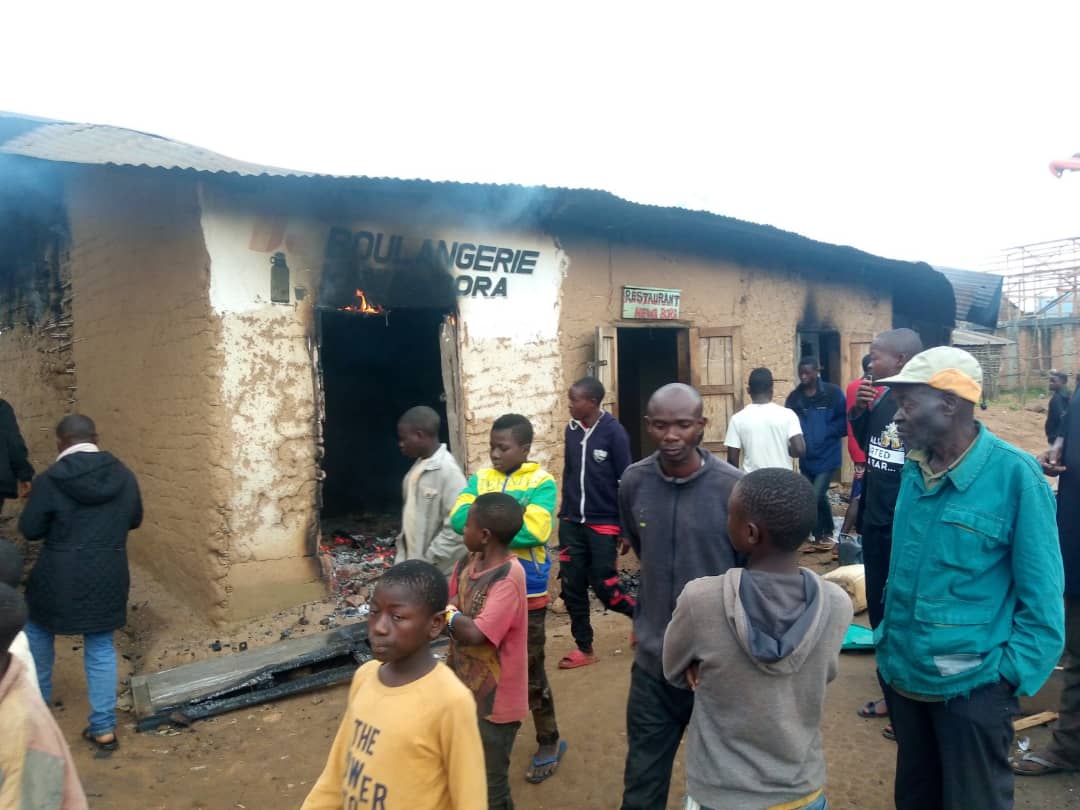
കോംഗോ : കോംഗോയിലെ മാമോവിന് സമീപമുള്ള ഒരു ക്രിസ്ത്യൻ ഗ്രാമത്തിനു നേരെയാണ് ഇസ്ലാമിസ്റ്റ് അലൈഡ് ഡെമോക്രാറ്റിക് ഫോഴ്സ് എന്ന ഭീകരവാദികൾ ആക്രമണം നടത്തിയത്. ആക്രമണത്തിൽ മൂന്ന് ക്രൈസ്തവർ കൊല്ലപ്പെട്ടു. നിരവധി പേരെ ഭീകരർ തട്ടിക്കൊണ്ടുപോകുകയും ചെയ്തു.
ജൂലൈ 16-ന് രാത്രിയാണ് ആക്രമണം ഉണ്ടായത്. ആക്രമണത്തിൽ ഏഴ് വീടുകൾ കത്തിനശിച്ചു. പ്രദേശവാസികളോടും ചുറ്റുമുള്ള സമൂഹങ്ങളോടും ജാഗ്രത പാലിക്കാൻ ആംഗ്ലിക്കൻ ചർച്ച് ഓഫ് ബെനിയുടെ ബിഷപ്പ് ആഹ്വാനം ചെയ്തു.
Sources:christianlive
world news
ടൂറിസ്റ്റുകൾക്ക് ആരോഗ്യഇൻഷൂറൻസ് പദ്ധതിയുമായി യു.എ.ഇ

ദുബൈ: ടൂറിസ്റ്റുകൾക്ക് ആരോഗ്യഇൻഷൂറൻസ് പദ്ധതിയുമായി യു.എ.ഇ. രാജ്യത്തെ ഫെഡറൽ അതോറിറ്റി ഫോർ ഐഡന്ററി, സിറ്റിസൻഷിപ്പ്, കസ്റ്റംസ് ആൻഡ് പോർട്ടാണ് (ICP) രാജ്യത്ത് ടൂറിസ്റ്റുകളായി എത്തുന്നവർക്ക് ആരോഗ്യ ഇൻഷൂറൻസ് ലഭ്യമാക്കാൻ പുതിയ പദ്ധതി നടപ്പാക്കുന്നത്. യു.എ.ഇ സന്ദർശിക്കാൻ വിസക്ക് അപേക്ഷിക്കുമ്പോൾ തന്നെ ആരോഗ്യ ഇൻഷൂറൻസിനും അപേക്ഷ നൽകാൻ ICP യുടെ വെബ്സൈറ്റിലും, മൊബൈൽ ആപ്ലിക്കേഷനിലും സൗകര്യമുണ്ടാകും. ഇൻഷൂറൻസ് തുക, മറ്റ് സേവന മാനദണ്ഡങ്ങൾ എന്നിവ രാജ്യത്തെ പ്രമുഖ ഇൻഷൂറൻസ് കമ്പനികളുമായി ചേർന്നാണ് നടപ്പാക്കുകയെന്ന് ഫെഡറൽ അതോറിറ്റി അറിയിച്ചു. യു.എ.ഇയിൽ വിനോദസഞ്ചാരികളായി എത്തുന്ന സന്ദർശകർക്ക് അടിയന്തരഘട്ടങ്ങളിൽ രാജ്യത്തെ ആശുപത്രികളെ ചികിൽസക്കായി ആശ്രയിക്കുന്നതിന് ഈ പദ്ധതി ഏറെ ഗുണം ചെയ്യുമെന്നാണ് വിലയിരുത്തൽ. പുതിയ പദ്ധതിയെ വിവിധ ഇൻഷൂറൻസ്, ആരോഗ്യ സ്ഥാപനങ്ങൾ സ്വാഗതം ചെയ്തു.
Sources:globalindiannews
-
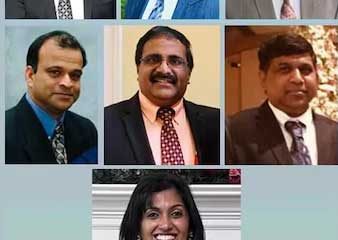
 us news11 months ago
us news11 months agoനോര്ത്ത് അമേരിക്കന് പെന്തക്കോസ്തല് റൈറ്റേഴ്സ് ഫോറം; അറ്റ്ലാന്റാ ചാപ്റ്ററിന് പുതിയ ഭാരവാഹികള്
-

 National11 months ago
National11 months agoബൈബിൾ വിതരണം ചെയ്യുന്നതും നല്ല മൂല്യങ്ങൾ പഠിപ്പിക്കുന്നതും മതപരിവർത്തനമല്ല: അലഹബാദ് ഹൈക്കോടതിയുടെ നിര്ണ്ണായക വിധി
-

 world news10 months ago
world news10 months ago50 രാജ്യങ്ങളിലേക്ക് കുവൈത്ത് പൗരന്മാർക്ക് വിസയില്ലാതെ സഞ്ചരിക്കാം
-

 National5 months ago
National5 months agoനെയ്തേലിപ്പടി ക്രൂസേഡിന് അനുഗ്രഹീത സമാപ്തി
-

 Life11 months ago
Life11 months agoസൂര്യനെ ലക്ഷ്യമിട്ട് കുതിച്ച് ആദിത്യ എൽ1; ഇന്ത്യയുടെ ആദ്യ സൗരദൗത്യം വിജയകരം
-

 National9 months ago
National9 months agoPentecostal mission center demolished in India; pastor, 17 others arrested
-

 Life10 months ago
Life10 months agoമനുഷ്യന് താമസിക്കാന് ചന്ദ്രനില് വീടുകള്; നാസ 3ഡി പ്രിന്ററുകള് ചന്ദ്രനിലേക്കയക്കും
-

 Sports6 months ago
Sports6 months agoMichigan Head Coach Jim Harbaugh Reveals ‘Mini Revival’, 70 Players Baptized Last Season









